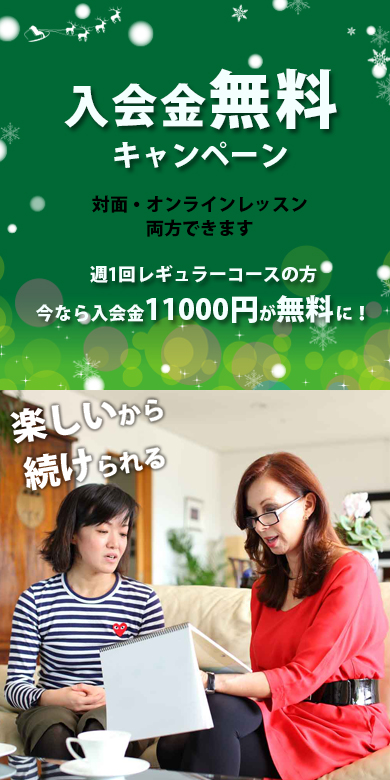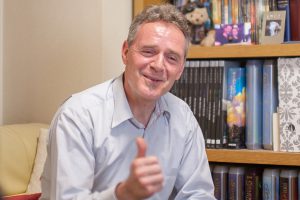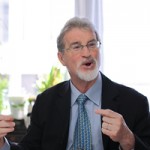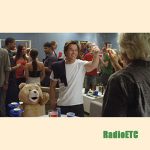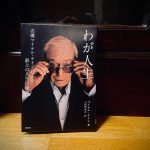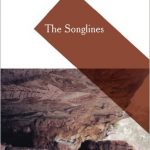技術英語にはギリシャ語とラテン語を ピーター先生(小岩) ETCマンツーマン英会話
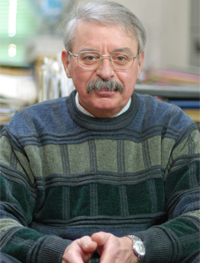 Q: 生まれ故郷の思い出についてお話しいただけますか?
Q: 生まれ故郷の思い出についてお話しいただけますか?
それは難しいです。私は今までに21カ国で暮してきたからです。生れはテキサス州のエルパソ、でも、そこには3日しかおらず、メキシコに行きました。そして3歳のときにイングランドに越しました。そして4歳の時にスコットランドへ。その後アイスランドに住み、英語を学ぶために、オーストラリアに行きました。当時英語が話せなかったのです。オーストラリアで10ヶ月過ごした後、ハワイに越し、一年間住みました。日本に始めてきたのは1958年、旅行でした。父の仕事の関係でたくさんの国に住みました。フィリピン、マレーシア、シンガポール、ベトナム、インド、パキスタン、南アフリカなど。だから生まれ故郷についてお話しするのは難しいのです。
I think it’s difficult, because I’ve lived 21 countries. And I was born in El Paso Texas. But I was only there 3 days and then to Mexico.
And then when I was 3, we lived in England. And then when 4, I lived in Scotland. Then we lived in Iceland. And then I was sent to Australia to learn English, because I could not speak English. After 10 months in Australia, I moved to Hawaii, and lived there for 1 year. First came to Japan was 1958. We had been here for tourists, when we lived in Philippine, because of my father work. Many countries, Philippines, Malaysia, Singapore, Vietnam, India, Pakistan, South Africa, Many countries. So that’s why I am saying it’s little difficult.
その後、オーストラリアで軍隊学校に入学、後に日本の大学で学び、フィリピンで国際経済開発研究の大学を卒業しました。
And then I was in a military school in Austria. After that, I came to the university here in Japan and I graduated the school in Philippines at international economic develop research university.
Q: なぜ英語の先生になられたのですか?
私が英語を教えていたほとんどの方は、大学教授でした。皆さん技術科学者で、とても興味深いものでした。英会話の勉強というよりも、国際学会に提出する論文を作成していました。これらの論文は、第一に英語で作成しなければならないこと、第二に日本の技術を英語に訳すことはとても難しいということ。日本語はやや漠然とした言葉なのです。そこで、技術的知識のバックグラウンドがあり、英語が話せる私が必要とされたのです。 In a most of people whom I taught were Japanese professors. So it was interesting to talk to. And the most of time with them, we were doing engineering. So it was not really English conversation, mainly we did proof reading, because they wanted to submit their research to international publications. So it has to be number 1 in English. And number 2, it has to be taking translating Japanese engineering into English is very difficult, because Japanese is little vague. They want somebody who of course speaks English, also has engineering background. So I can understand that.
Q:レッスンで英語を学んでも、実際にネイティブが話す英語を聞いて理解できず、ショックを受ける生徒さんが多数いらっしゃいます。実際に話されている英語を理解するために、なにかアドバイスはありますか。
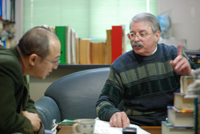 一番大切なことは、話すということです。それが正しいか正しくないかは心配しないでください。話せばいいのです。何事にも練習が必要です。よりたくさんしゃべれば、より早く上達するでしょう。完璧な文章を考えて、考えて、考えていたら、コミュニケートすることができなくなってしまいます。ただただ話しましょう。正しかろうと無かろうと関係ないのです。日本以外のほとんどの国は、誤りを気にしていませんよ。あなたがフランスやドイツなど、ヨーロッパに行ったら、彼らは間違うことなど気にしていないことに気づくでしょう。
一番大切なことは、話すということです。それが正しいか正しくないかは心配しないでください。話せばいいのです。何事にも練習が必要です。よりたくさんしゃべれば、より早く上達するでしょう。完璧な文章を考えて、考えて、考えていたら、コミュニケートすることができなくなってしまいます。ただただ話しましょう。正しかろうと無かろうと関係ないのです。日本以外のほとんどの国は、誤りを気にしていませんよ。あなたがフランスやドイツなど、ヨーロッパに行ったら、彼らは間違うことなど気にしていないことに気づくでしょう。
The most important thing is to speak. Don’t worry about whether it is correct or not. It’s better speaking, like anything takes practice. So the more you speak, the faster you improve. If you were just thinking, thinking, thinking for the perfect sentence, you would never communicate. So I just say, just speak, doesn’t matter with the perfectly accrued or not, because outside of Japan, in most of countries, people don’t care. I mean you go to Europe, French and Germany, they don’t care of made a mistake or anything.
同じことが私にも言えます。私はたくさんの外国語を学ぶ必要がありました。スペイン語、ゲール語、フィリピン語など。でも学校で正式に学んだのは英語だけなんです。レッスンでも、できるだけたくさん話してください。小さい間違いがあったとしても、私はそれを指摘して会話を中断させたりしたくありません。
And same thing, I had to learn languages. The only language I learned officially by school was English. But I have to learn Spanish, Gaelic, Filipino and all this. I just say to them just speak as much you can, if it is a big mistake, I’ll correct it, but if it is a small mistake, I don’t want to break the conversation.
もう一点は、興味があることは何かとういことです。より興味のあるとは、より話し易くなります。そして文法は気にしないで下さい。オーストラリアでは、文法を学ぶのはたった二年間だけなのです。日本で何故そんなに文法に時間をかけるのかが理解できません。
But also the other thing is that I ask them what is interested in. If it is interested in usually the more, the easier to speak, because they have interest. And I ask them to please don’t worry about grammar. Because in Australia, we only have 2 years for grammar. That’s it. Finished. I don’t know why so much grammar in Japan.
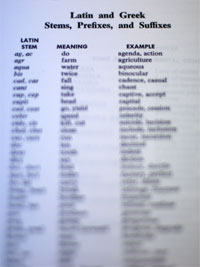 生徒さんによって、ギリシャ語とラテン語の勉強も同じレッスンの中で行っています。たとえば、dentは歯という意味、英語でdentistというと歯医者になります。Marは海という意味。英語では、Submarine(潜水艦)という単語がありますね。これらはすべてラテン語です。Peddは足、Peddleといいますね。 Spectreは見る。英語でInspector は検査官。In、im、il、ir、unはnoという意味。convenient と inconvenient、possible とimpossible、 regular と irregular、interesting と uninteresting。ラテン語とギリシャ語の幾つかを知っていると英語はとても簡単です。すべてのロマンス語は、ラテン語とギリシャ語から生れているのです。ですから、これらを知っていると、ドイツ語やフランス語も話せます。
生徒さんによって、ギリシャ語とラテン語の勉強も同じレッスンの中で行っています。たとえば、dentは歯という意味、英語でdentistというと歯医者になります。Marは海という意味。英語では、Submarine(潜水艦)という単語がありますね。これらはすべてラテン語です。Peddは足、Peddleといいますね。 Spectreは見る。英語でInspector は検査官。In、im、il、ir、unはnoという意味。convenient と inconvenient、possible とimpossible、 regular と irregular、interesting と uninteresting。ラテン語とギリシャ語の幾つかを知っていると英語はとても簡単です。すべてのロマンス語は、ラテン語とギリシャ語から生れているのです。ですから、これらを知っていると、ドイツ語やフランス語も話せます。
Depend on person, I use this. I learned English, I also learned Greek and Latin at the same class. If you take any word that you know. Let’s take, here you have dent means tooth. So you have dentist is a doctor. If you take mar. means sea. So you have submarine. These are all Latin. If you take pedd, pedd means foot. So you have Peddle. Then you have “spectre” means to see or to look. Inspector. You have in im il ir un. It means no. You have convenient and inconvenient. Possible and impossible. Regular and irregular. Interesting and uninteresting. So if you know some of these, English is very easy. This is Latin and Greek. All Romans languages come through Latin and Greek. So if you know certain Latin and Greek, you can speak German, French.
logyは学問という意味。Egyptologyはエジプト学、geoは土という時意味、geologyは地質学、Horrorは時間、Horologyは計時学、psycheは心理、psychologyは心理学。
Logy means study of. Egyptology is study of Egypt. You have geology. Geo means earth. Study of earth. Horror means time. Study of clocks, Horology. Psyche is mine, psychology.
Phobiaは異常な恐れ、Acroは高い場所。ですから、acrophobiaは高所恐怖症。Claustroは狭い場所、Claustrophobiaは閉所恐怖症、Inは否定。Somnは睡眠。Insomniaは不眠症。Ambularは歩く。Somnambularは夢遊病者。Pyroは火、Pyromaniaは放火魔。
phobia means extreme fear, unusual fear. So you have, Acro means high place, so acrophobia. Fear of high place. Claustro means narrow. Claustrophobia is fear of narrow places. In not. Somn sleep. Cannot sleep. Insomnia. Somn again means sleep. Ambular means walk. Sleepwalk. Somnambular. Pyro fire. Pyromania, likes to make fire.
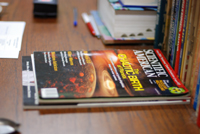 オーストラリアのすべての学校では、これを学びます。アメリカでは学びません。なぜなのでしょう。これを覚えると、単語を見ただけで、その意味とスペルが推測できるようになるのです。また、科学技術に関する単語は、ラテン語を多用しています。
オーストラリアのすべての学校では、これを学びます。アメリカでは学びません。なぜなのでしょう。これを覚えると、単語を見ただけで、その意味とスペルが推測できるようになるのです。また、科学技術に関する単語は、ラテン語を多用しています。
In Australia, in school, all schools teach like this, in America they don’t. I don’t know why. But having this, it’s easy. If I see the words, I can guess and also for meaning and for spelling. And in engineering or science, we use a lot of Latin.
☆ピーター先生出演のRadioETC/Podcasting 単語の意味が直感的にわかるようになる方法
https://etc-eikaiwa.com/25podcast/post_170.html

